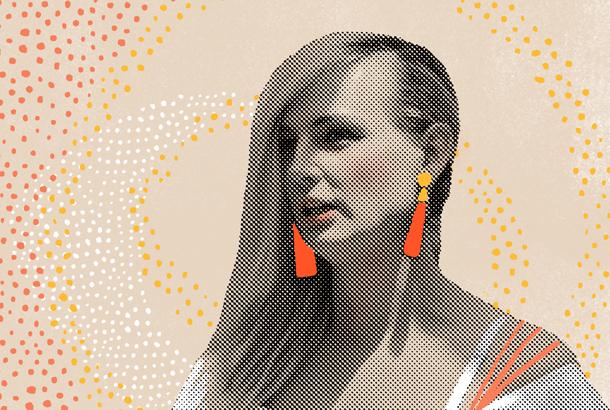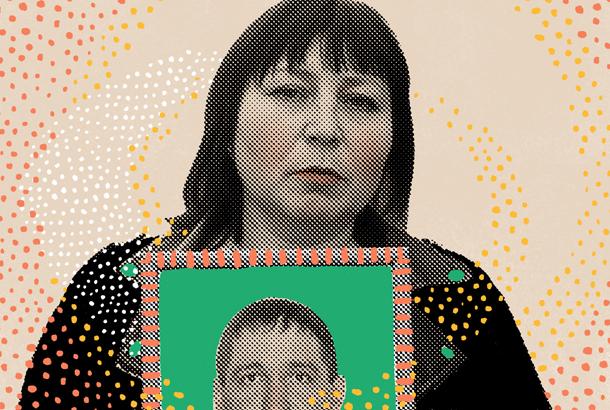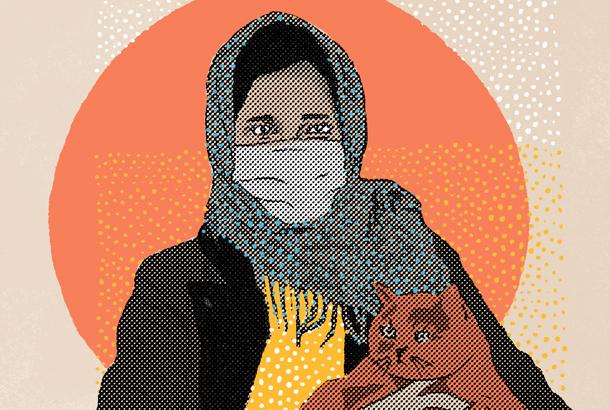Profils des pays d'Europe de l'Est
Fighting State-Sanctioned Torture against Transgender People
Forum for Human Rights (Czech Republic)
 Zara Kromková (illustration by Vérane Cottin, photograph by Forum for Huma Rights)
Zara Kromková (illustration by Vérane Cottin, photograph by Forum for Huma Rights)
Zara Kromková describes her transition to womanhood as “relatively simple and quick.” However, she acknowledges that this was for all the wrong reasons.
“I fulfilled all the doctor’s ideas about what a woman should look like. That’s why my medical transition was really good,” said Kromková in an interview with Queer Youth Slovakia, an LGBT magazine.
According to Kromková, in Slovakia and the Czech Republic, trans people are required to be a perfect example of their gender identity in order to “prove” it is genuine.
“The doctor asked me why I don’t wear a skirt... because according to her all women must wear skirts,” Kromková recalls. Many people who are born female prefer not to wear skirts — Kromková’s doctor included. “[She] did not meet her own standards. That made no sense to me,” says Kromková.
For some Slovak and Czech trans people, these standards take a violent form. In order to gain legal recognition for their identity, trans persons are forced to undergo gender reassignment surgery together with sterilization. In the Czech Republic, such practices are codified into legislation.
Maroš Matiaško, legal counsel at Forum for Human Rights (Forum), stresses the severity of these laws: “[This is] one of the most harmful practices we have identified.”
Like Forum, various United Nations committees define non-consensual gender resignment and forced sterilization as a form of torture. In a 2013 report, former United Nations Special Rapporteur on Torture Juan. E. Méndez explained that this is because these practices cause severe suffering without a legitimate reason.
A Strategic Approach
With the financial support of the United Nations Voluntary Fund for Victims of Torture, Forum seeks to bring redress to victims of torture through litigation, advocacy and legal assistance.
Based in Eastern Europe, Forumworks on both the domestic and international levels to help victims of this kind of torture. In partnership with Prizma, an NGO with similar ideals, Matiaško and his team have been litigating the case of survivors in an attempt to bring them justice. One of them, Mr. R., “ has been forced to undergo castration despite his refusal for seven years. [He] became the hostage of this persisting harmful practice, resulting, over time, in a grave psychological torment,” says Zara.
In litigating cases like that of Mr. R.’s, Forum’s approach is also strategic. According to Matiaško, “[it] may eventually result in abolishing this particularly harmful practice.”
Much of Forum’sadvocacy takes place on the international stage. For instance, in 2021, they submitted information to the United Nations Committee against Torture about the Czech Republic.
This work helps put transgender rights on the Czech State’s agenda. It also allows Forum to contribute to the recommendations made by the United Nations Committee Against Torture — and join efforts to hold the government accountable for abuses committed against victims such as Mr. R.
Forum for Human Rights received its first grant from the United Nations Voluntary Fund for Victims of Torture in 2022.
Fighting from Afar
Siberia Without Torture (Russian Federation)
 Galina (illustration by Vérane Cottin, photograph by Siberia without Torture)
Galina (illustration by Vérane Cottin, photograph by Siberia without Torture)
Although he remains in Poland, Yevgeny Khasoev’s heart — and his work — are in his native Siberia.
In Siberia, Khasoev, who is a lawyer, defended opposition figures and victims of police violence against the Russian government. As one of the leading figures of Siberia without Torture, the only human rights organization East of the Ural Mountains, Khasoev helped the organization review more than 500 torture complaints, successfully opened 11 criminal cases and held seven law enforcement officers accountable for their actions.
Fearing for his life, Khasoev, fled to Poland in February 2022. For now, Khasoev can sigh relief as a Polish judge has decided to deny the Russian Federation his extradition to face terrorism charges in Moscow, finding that the criminal case against Khasoev showed “signs of falsification.”
Proof that That Persecution Exists Everywhere
In 2018, the United Nations Committee against Torture expressed concern that the Russian definition of torture was not in full compliance with the Convention, adding that there was reliable information that torture was practiced widely in the country, and indicating the need for a robust criminalization of torture.
With funding from the United Nations Voluntary Fund for Victims of Torture, Siberia without Torture provides medical attention, psychological therapy, social rehabilitation and legal representation to survivors of torture, in addition to operating a hotline and a website to locate victims requiring assistance.
While the medical and psychological care integrates survivors back into society, the legal representation also proves crucial: the NGO’s lawyers defend victims against criminal charges brought by confessions obtained through torture. Siberia without Torture also assists clients in preparing asylum papers for immediate resettlement in another country. The organization receives 15 to 30 complaints every month, of which it can afford to take 40 per year.
“The operations officers arrested my husband and took him to the temporary detention center where he allegedly died of a heart attack,” said Galina, one of the 300 clients of Siberia. “When I took his body out of the morgue, it was beaten all over.”
For their work, Khasoev and founder Svyatoslav Khromenkov as well as a team of psychologists, doctors and attorneys have not only been arrested and detained, but also had their doors broken down in the middle of the night, their private possessions seized and have been tagged as foreign agents.” But the work continues, and despite the persecution, they keep going.
“My husband was beaten by officers of the Rosgvardia. He was beaten on the head with helmets, after which there was a shot. Then my husband died.” said Natalia, one of Siberia Without Torture’s clients. “I was left alone with two children.”
“It is with indignation and alarm that we note the unprecedented escalation of unjustified violence by law enforcement agencies against protesters, journalists doing their job, and even bystanders,” Khromenkov told the Moscow Times.
“Authorities always try to control us, but our spirit of freedom drives us to do what we do while the government tries to curb and control this spirit…”
Siberia without Torture received its first grant from the United Nations Voluntary Fund for Victims of Torture in 2018.
Rescue, Recovery and Rehabilitation
Fundacja Ocalenie (Poland)
 Mural on the front wall of the foundation (illustration by Vérane Cottin, mural by Inga Skrzyszowska based on a photograph by Grzegorz Dąbrowski)
Mural on the front wall of the foundation (illustration by Vérane Cottin, mural by Inga Skrzyszowska based on a photograph by Grzegorz Dąbrowski)
“Rarely is the boundary between good and evil this clear.”
Fundacja Ocalenie published this statement in reference to the wall built in June 2022 by the Polish government to stop the influx of refugees trying to enter the European Union from Belarus. The Poland-based NGO, whose name translates to “Salvation Foundation”, has been providing refugees with assistance since the start of the border crisis in 2021.
"Our door is open to every person who experienced migration, many of our clients are seeking asylum, many have experienced torture or other kinds of violence,” says Dorota Przygucka, the project coordinator.
Before the physical wall, the border was distinguished by the “red zone”: a strip of land 3 km wide and 400 km long, characterized by swamps, forests and sub-zero temperatures. This no man’s land allegedly sees Belarussian officials push refugees into Poland and the Polish officials push them back to Belarus. Trapped in limbo, the refugees are forced to contend with dehydration, starvation, hypothermia and police brutality. Recent estimates from rights groups put the death toll at 21 people.
In 2021, the United Nations Human Rights Office announced that they had begun receiving “disturbing allegations” of refugee torture by security personnel from both sides. The United Nations Special Rapporteur on Torture urged the two Eastern European countries to “stop sacrificing migrant lives to a political dispute.”
Rebuilding Trust and Safety
In an interview with the Associated Press, Agata Kolodziej recalls her first day on the job for Ocalenie. Alongside her new team, she spent hours scouring the red zone, before eventually finding a refugee man lying alone in a ditch. He was freezing cold, desperately needing medical attention. Ocalenie staffled him out of the red zone and nursed him back to health.
With funding from the United Nations Voluntary Fund for Victims of Torture, Ocalenie has been able to give better lives to over 100 victims of torture per year. More than half of the grant is spent on psychological treatment, an invaluable tool for the recovery and rehabilitation of torture victims.
“In our psychological and therapeutic work we meet clients with a dialogical approach, gradually rebuilding trust and sense of safety, reinforcing their sense of agency and supporting their integration process while respecting the person's experience, values and beliefs," says Przygucka.
Fundacja Ocaleniereceived its first grant from the United Nations Voluntary Fund for Victims of Torture in 2020.
Recovering Lives After Decades of Torture
The ICAR Foundation (Romania)

Ileana Doina Budimir (illustration by Vérane Cottin, photograph by ICAR)
Ileana Doina Budimir was born in detention during the Communist era and still bore the wounds afterward. Her mother was four months pregnant when she was sentenced to prison.
“Members of my family from three generations were arrested as well. 64 years of detention, all together!”.
Budimir's mother stubbornly refused to agree to orphanage solution and relatives managed to obtain the right to take care of her. “My mother knew most of the detainees’ children who were taken to orphanages ended up disappearing and their parents were later provided with a death certificate, ” said Budimir.
“After I was taken away, she didn’t learn any news of me, because she was not allowed to receive letters and packages, and no one was allowed to visit her.”
Budimir’s mother was eventually assisted by the ICAR Foundation, the first and only institution that provided assistance to people who fought in Romania for a democratic society and suffered torture in communist prisons. Budimir herself received legal assistance through ICAR and obtained reparation from the Romanian state.
“ICAR’s three rehabilitation centers in Bucharest, Iasi, and Craiova offered comprehensive, multidisciplinary assistance to the victims of harsh political persecution during the 45 years of Communist rule,” said doctor Camelia Doru, who set up the organization in 1989. “ICAR was able to create a model of what the state should have been providing as rehabilitation programs to the survivors.”
With the first grant from the UN Voluntary Fund for Victims of Torture in 1993, ICAR started implementing its medical and psychological services and soon expanded to advocating for victims’ rights to truth and justice.
“ICAR activity had effects far beyond its projects, enabling systemic changes in the justice and accountability system, contributing to the reconciliation processes,” Doru said. Through the litigation project financed by the Fund, ICAR was part of the 2015 trial against the first torturer convicted for crimes against humanity.
A Change of Course
After the migrant crisis came to Romania’s borders, Doru saw similarities between the refugees and domestic torture survivors. As a transit country between the Middle East and Western Europe, Romania experienced a 238 per cent increase in asylum seekers from 2020 compared to 2019. Doru switched gears, signing collaboration protocols with the Romanian Immigration Office (ORI) and the United Nations High Commissioner for Refugees (UNHCR), to open a refugee reception and accommodation center.
At the center, in addition to receiving psychosocial counseling sessions, migrants can take Romanian language classes, cultural orientation sessions, and practical skills courses. In 2010, ICAR Foundation opened outreach offices in all other reception and accommodation centers of the Romanian Immigration Office throughout the country.
“Since 2010, ICAR has provided comprehensive rehabilitation services to asylum seekers and refugees in all reception and accommodation centers run by the Romanian Immigration authority, helped victims to heal their wounds, regain their self-esteem and dignity, and learn to cope with the sequelae of torture,” Begu said. “The aim is to strengthen self-confidence and autonomy, to initiate a long-term life project and feel part of the society again.”
The ICAR Foundation received their first grant from the United Nations Voluntary Fund for Victims of Torture in 1989.
Blue Bird (Ukraine): Psychologist helps thousands of fellow torture survivors

Hanna Mokrousova (illustration by Vérane Cottin, photograph by Blue Bird)
When the pro-Europe protests started in Ukraine in November 2013, tensions escalated in Donetsk and Luhansk. In the midst of the fighting, armed groups kidnapped and detained people. Including psychologist Hanna Mokrousova.
Released weeks later, Mokrousova fled to Kyiv. She noticed how many people had been subjected to methods of torture to intimidate and extract confessions. A 2014 UN human rights monitoring report on Ukraine stated that abuses by armed groups included torture, arbitrary and incommunicado detention, summary executions, forced labour, and sexual violence.
“There was a real avalanche of calls from friends, relatives and loved ones of people who were detained or went missing. Nobody knew what to do and everyone, for inexplicable reasons, was calling me,” Mokrousova said. “I had to do something. Whatever I could.”
Using funds and assistance from the UN Human Rights Monitoring Mission in Ukraine (HRMMU) and the United Nations Voluntary Fund for the Victims of Torture, Mokrousova founded Blakytniy Ptakh (Blue Bird), to provide victims of torture and their families with humanitarian, medical, psychological and legal assistance.
“I had no experience in project management and, frankly, knew nothing about human rights,” Mokrousova said. “UN human rights officers were my mentors and became my friends.”
Saving and supporting hostages
From the onset of the armed conflict in that region in 2014, the HRMMU has been interviewing victims of arbitrary detention, torture and ill-treatment from both sides and has referred victims and families to Blue Bird. Over the last five years, at least 3,000 people have received support from Blue Bird.
At the end of 2019, the Ukrainian government and the areas controlled by armed groups carried out an exchange and mass release of hostages. Seventy-six of the hostages were identified and added to the exchange list due to Blue Bird’s efforts. The Blue Bird team was their first emergency contact and supported them during and after their imprisonment.
When the Russian military attacked Ukraine in 2022, Blue Bird became one of the key NGOs on the ground. It has received hundreds of calls from families of hostages taken by armed groups. In 2022, the Spokesperson for the UN High Commissioner for Human Rights said that they believe that those detained are at risk of torture or other ill-treatment. Blue Bird intervenes by establishing contact between army officials and families when possible, gathering medication and food for the hostages, and offering psychological help and rehabilitation assistance after their release.
It can take weeks, months or years for a hostage to be released and reunited with his or her family. Blue Bird remains a source of support throughout.
“It is very important that people are not alone with their grief. We help them to deal with hopelessness and not to feel abandoned, not to give up and continue to fight for the release of a loved one,” Mokrousova said.
Blue Bird received its first grant from the United Nations Voluntary Fund for Victims of Torture in 2018.
VOIR CETTE PAGE EN :